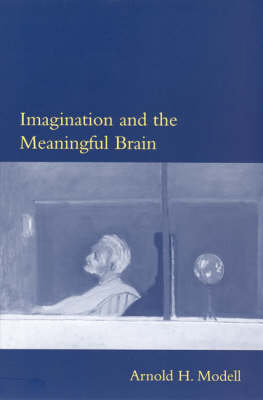
Imagination and the Meaningful Brain
Seiten
2006
Bradford Books (Verlag)
978-0-262-63343-7 (ISBN)
Bradford Books (Verlag)
978-0-262-63343-7 (ISBN)
- Keine Verlagsinformationen verfügbar
- Artikel merken
An exploration of the biology of meaning that integrates the role of subjective processes with current knowledge of brain/mind function.
The ultimate goal of the cognitive sciences is to understand how the brain works-how it turns "matter into imagination." In Imagination and the Meaningful Brain, psychoanalyst Arnold Modell claims that subjective human experience must be included in any scientific explanation of how the mind/brain works. Contrary to current attempts to describe mental functioning as a form of computation, his view is that the construction of meaning is not the same as information processing. The intrapsychic complexities of human psychology, as observed through introspection and empathic knowledge of other minds, must be added to the third-person perspective of cognitive psychology and neuroscience.
Assuming that other mammals are conscious and conscious of their feelings, Modell emphasizes evolutionary continuities and discontinuities of emotion. The limbic system, the emotional brain, is of ancient origin, but only humans have the capacity for generative imagination. By means of metaphor, we are able to interpret, displace, and transform our feelings. To bolster his argument, Modell draws on a variety of disciplines-including psychoanalysis, cognitive psychology, neurobiology, evolutionary biology, linguistics, philosophy of language, and philosophy of mind. Only by integrating the objectivity of neuroscience, the phenomenology of introspection, and the intersubjective knowledge of psychoanalysis, he claims, will we be able fully to understand how the mind works.
The ultimate goal of the cognitive sciences is to understand how the brain works-how it turns "matter into imagination." In Imagination and the Meaningful Brain, psychoanalyst Arnold Modell claims that subjective human experience must be included in any scientific explanation of how the mind/brain works. Contrary to current attempts to describe mental functioning as a form of computation, his view is that the construction of meaning is not the same as information processing. The intrapsychic complexities of human psychology, as observed through introspection and empathic knowledge of other minds, must be added to the third-person perspective of cognitive psychology and neuroscience.
Assuming that other mammals are conscious and conscious of their feelings, Modell emphasizes evolutionary continuities and discontinuities of emotion. The limbic system, the emotional brain, is of ancient origin, but only humans have the capacity for generative imagination. By means of metaphor, we are able to interpret, displace, and transform our feelings. To bolster his argument, Modell draws on a variety of disciplines-including psychoanalysis, cognitive psychology, neurobiology, evolutionary biology, linguistics, philosophy of language, and philosophy of mind. Only by integrating the objectivity of neuroscience, the phenomenology of introspection, and the intersubjective knowledge of psychoanalysis, he claims, will we be able fully to understand how the mind works.
Arnold H. Modell is Clinical Professor of Psychiatry at Harvard Medical School. Andrew Dobson is Professor of Politics at Keele University, UK. He is the author of Justice and the Environment, Green Political Thought, and Citizenship and the Environment.
| Erscheint lt. Verlag | 11.8.2006 |
|---|---|
| Reihe/Serie | Philosophical Psychopathology |
| Zusatzinfo | 5 illus. |
| Verlagsort | Massachusetts |
| Sprache | englisch |
| Maße | 137 x 203 mm |
| Gewicht | 295 g |
| Themenwelt | Geisteswissenschaften ► Psychologie ► Allgemeine Psychologie |
| Geisteswissenschaften ► Psychologie ► Verhaltenstherapie | |
| ISBN-10 | 0-262-63343-4 / 0262633434 |
| ISBN-13 | 978-0-262-63343-7 / 9780262633437 |
| Zustand | Neuware |
| Informationen gemäß Produktsicherheitsverordnung (GPSR) | |
| Haben Sie eine Frage zum Produkt? |
Mehr entdecken
aus dem Bereich
aus dem Bereich
Techniken der Verhaltenstherapie
Buch (2024)
Julius Beltz GmbH & Co. KG (Verlag)
CHF 48,95


